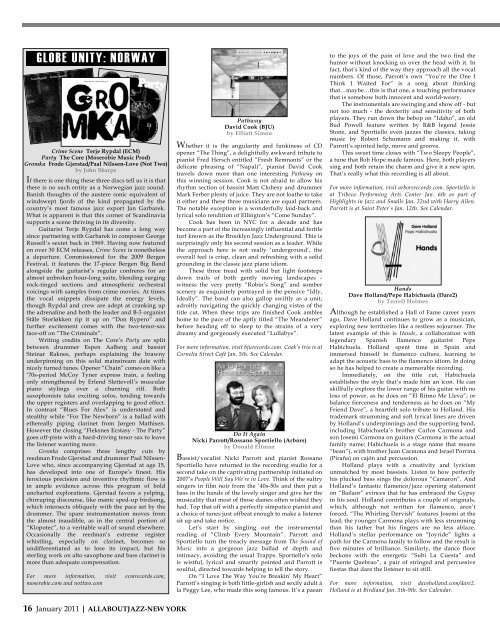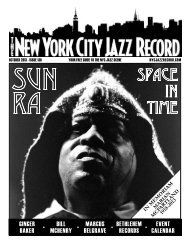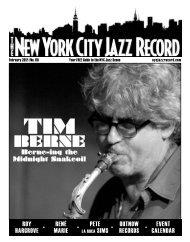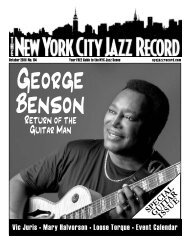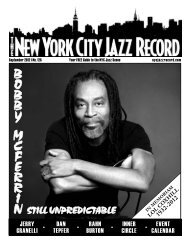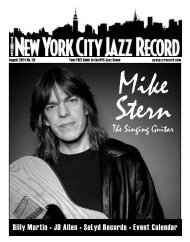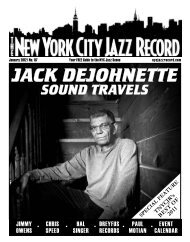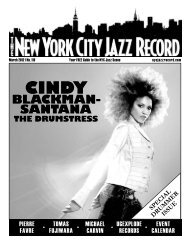heart of gold - The New York City Jazz Record
heart of gold - The New York City Jazz Record
heart of gold - The New York City Jazz Record
Create successful ePaper yourself
Turn your PDF publications into a flip-book with our unique Google optimized e-Paper software.
GLOBE UNITY: NORWAY<br />
Crime Scene Terje Rypdal (ECM)<br />
Party <strong>The</strong> Core (Moserobie Music Prod)<br />
Gromka Frode Gjerstad/Paal Nilssen-Love (Not Two)<br />
by John Sharpe<br />
If there is one thing these three discs tell us it is that<br />
there is no such entity as a Norwegian jazz sound.<br />
Banish thoughts <strong>of</strong> the austere sonic equivalent <strong>of</strong><br />
windswept fjords <strong>of</strong> the kind propagated by the<br />
country’s most famous jazz export Jan Garbarek.<br />
What is apparent is that this corner <strong>of</strong> Scandinavia<br />
supports a scene thriving in its diversity.<br />
Guitarist Terje Rypdal has come a long way<br />
since partnering with Garbarek in composer George<br />
Russell’s sextet back in 1969. Having now featured<br />
on over 30 ECM releases, Crime Scene is nonetheless<br />
a departure. Commissioned for the 2009 Bergen<br />
Festival, it features the 17-piece Bergen Big Band<br />
alongside the guitarist’s regular confreres for an<br />
almost unbroken hour-long suite, blending surging<br />
rock-tinged sections and atmospheric orchestral<br />
voicings with samples from crime movies. At times<br />
the vocal snippets dissipate the energy levels,<br />
though Rypdal and crew are adept at cranking up<br />
the adrenaline and both the leader and B-3 organist<br />
Ståle Storløkken rip it up on “Don Rypero” and<br />
further excitement comes with the two-tenor-sax<br />
face-<strong>of</strong>f on “<strong>The</strong> Criminals”.<br />
Writing credits on <strong>The</strong> Core’s Party are split<br />
between drummer Espen Aalberg and bassist<br />
Steinar Raknes, perhaps explaining the brawny<br />
underpinning on this solid mainstream date with<br />
nicely turned tunes. Opener “Chain” comes on like a<br />
‘70s-period McCoy Tyner express train, a feeling<br />
only strengthened by Erlend Slettevoll’s muscular<br />
piano stylings over a churning riff. Both<br />
saxophonists take exciting solos, tending towards<br />
the upper registers and overlapping to good effect.<br />
In contrast “Blues For Alex” is understated and<br />
stealthy while “For <strong>The</strong> <strong>New</strong>born” is a ballad with<br />
ethereally piping clarinet from Jørgen Mathisen.<br />
However the closing “Fleksnes Ecstasy - <strong>The</strong> Party”<br />
goes <strong>of</strong>f-piste with a hard-driving tenor sax to leave<br />
the listener wanting more.<br />
Gromka comprises three lengthy cuts by<br />
reedman Frode Gjerstad and drummer Paal Nilssen-<br />
Love who, since accompanying Gjerstad at age 15,<br />
has developed into one <strong>of</strong> Europe’s finest. His<br />
ferocious precision and inventive rhythmic flow is<br />
in ample evidence across this program <strong>of</strong> bold<br />
uncharted explorations. Gjerstad favors a yelping,<br />
chirruping discourse, like manic sped-up birdsong,<br />
which intersects obliquely with the pace set by the<br />
drummer. <strong>The</strong> spare instrumentation moves from<br />
the almost inaudible, as in the central portion <strong>of</strong><br />
“Klopotec”, to a veritable wall <strong>of</strong> sound elsewhere.<br />
Occasionally the reedman’s extreme register<br />
whistling, especially on clarinet, becomes so<br />
undifferentiated as to lose its impact, but his<br />
sterling work on alto saxophone and bass clarinet is<br />
more than adequate compensation.<br />
For more information, visit ecmrecords.com,<br />
moserobie.com and nottwo.com<br />
16 January 2011 | ALLABOUTJAZZ-NEW YORK<br />
Pathway<br />
David Cook (BJU)<br />
by Elliott Simon<br />
Whether it is the angularity and funkiness <strong>of</strong> CD<br />
opener “<strong>The</strong> Thing”, a delightfully awkward tribute to<br />
pianist Fred Hersch entitled “Fresh Remnants” or the<br />
delicate phrasing <strong>of</strong> “Napali”, pianist David Cook<br />
travels down more than one interesting Pathway on<br />
this winning session. Cook is not afraid to allow his<br />
rhythm section <strong>of</strong> bassist Matt Clohesy and drummer<br />
Mark Ferber plenty <strong>of</strong> juice. <strong>The</strong>y are not loathe to take<br />
it either and these three musicians are equal partners.<br />
<strong>The</strong> notable exception is a wonderfully laid-back and<br />
lyrical solo rendition <strong>of</strong> Ellington’s “Come Sunday”.<br />
Cook has been in NYC for a decade and has<br />
become a part <strong>of</strong> the increasingly influential and fertile<br />
turf known as the Brooklyn <strong>Jazz</strong> Underground. This is<br />
surprisingly only his second session as a leader. While<br />
the approach here is not really ‘underground’, the<br />
overall feel is crisp, clean and refreshing with a solid<br />
grounding in the classic jazz piano idiom.<br />
<strong>The</strong>se three tread with solid but light footsteps<br />
down trails <strong>of</strong> both gently moving landscapes -<br />
witness the very pretty “Robin’s Song” and somber<br />
scenery as exquisitely portrayed in the pensive “Idly,<br />
Ideally”. <strong>The</strong> band can also gallop swiftly as a unit,<br />
adroitly navigating the quickly changing vistas <strong>of</strong> the<br />
title cut. When these trips are finished Cook ambles<br />
home to the pace <strong>of</strong> the aptly titled “<strong>The</strong> Meanderer”<br />
before heading <strong>of</strong>f to sleep to the strains <strong>of</strong> a very<br />
dreamy and gorgeously executed “Lullabye”.<br />
For more information, visit bjurecords.com. Cook’s trio is at<br />
Cornelia Street Café Jan. 5th. See Calendar.<br />
Do It Again<br />
Nicki Parrott/Rossano Sportiello (Arbors)<br />
by Donald Elfman<br />
Bassist/vocalist Nicki Parrott and pianist Rossano<br />
Sportiello have returned to the recording studio for a<br />
second take on the captivating partnership initiated on<br />
2007’s People Will Say We’re in Love. Think <strong>of</strong> the sultry<br />
singers in film noir from the ‘40s-50s and then put a<br />
bass in the hands <strong>of</strong> the lovely singer and give her the<br />
musicality that most <strong>of</strong> those dames <strong>of</strong>ten wished they<br />
had. Top that <strong>of</strong>f with a perfectly simpatico pianist and<br />
a choice <strong>of</strong> tunes just <strong>of</strong>fbeat enough to make a listener<br />
sit up and take notice.<br />
Let’s start by singling out the instrumental<br />
reading <strong>of</strong> “Climb Every Mountain”. Parrott and<br />
Sportiello turn the treacly message from <strong>The</strong> Sound <strong>of</strong><br />
Music into a gorgeous jazz ballad <strong>of</strong> depth and<br />
intimacy, avoiding the usual Trapps. Sportiello’s solo<br />
is wistful, lyrical and smartly pointed and Parrott is<br />
soulful, directed towards helping to tell the story.<br />
On “I Love <strong>The</strong> Way You’re Breakin’ My Heart”<br />
Parrott’s singing is both little-girlish and sexily adult à<br />
la Peggy Lee, who made this song famous. It’s a paean<br />
to the joys <strong>of</strong> the pain <strong>of</strong> love and the two find the<br />
humor without knocking us over the head with it. In<br />
fact, that’s kind <strong>of</strong> the way they approach all the vocal<br />
numbers. Of those, Parrott’s own “You’re the One I<br />
Think I Waited For” is a song about thinking<br />
that…maybe…this is that one, a touching performance<br />
that is somehow both innocent and world-weary.<br />
<strong>The</strong> instrumentals are swinging and show <strong>of</strong>f - but<br />
not too much - the dexterity and sensitivity <strong>of</strong> both<br />
players. <strong>The</strong>y run down the bebop on “Idaho”, an old<br />
Bud Powell feature written by R&B legend Jessie<br />
Stone, and Sportiello even jazzes the classics, taking<br />
music by Robert Schumann and making it, with<br />
Parrott’s spirited help, move and groove.<br />
This sweet time closes with “Two Sleepy People”,<br />
a tune that Bob Hope made famous. Here, both players<br />
sing and both retain the charm and give it a new spin.<br />
That’s really what this recording is all about.<br />
For more information, visit arborsrecords.com. Sportiello is<br />
at Tribeca Performing Arts Center Jan. 6th as part <strong>of</strong><br />
Highlights in <strong>Jazz</strong> and Smalls Jan. 22nd with Harry Allen.<br />
Parrott is at Saint Peter’s Jan. 12th. See Calendar.<br />
Hands<br />
Dave Holland/Pepe Habichuela (Dare2)<br />
by Terrell Holmes<br />
Although he established a Hall <strong>of</strong> Fame career years<br />
ago, Dave Holland continues to grow as a musician,<br />
exploring new territories like a restless sojourner. <strong>The</strong><br />
latest example <strong>of</strong> this is Hands, a collaboration with<br />
legendary Spanish flamenco guitarist Pepe<br />
Habichuela. Holland spent time in Spain and<br />
immersed himself in flamenco culture, learning to<br />
adapt the acoustic bass to the flamenco idiom. In doing<br />
so he has helped to create a memorable recording.<br />
Immediately, on the title cut, Habichuela<br />
establishes the style that’s made him an icon. He can<br />
skillfully explore the lower range <strong>of</strong> his guitar with no<br />
loss <strong>of</strong> power, as he does on “El Ritmo Me Lleva”; or<br />
balance fierceness and tenderness as he does on “My<br />
Friend Dave”, a <strong>heart</strong>felt solo tribute to Holland. His<br />
trademark strumming and s<strong>of</strong>t lyrical lines are driven<br />
by Holland’s underpinnings and the supporting band,<br />
including Habichuela’s brother Carlos Carmona and<br />
son Josemi Carmona on guitars (Carmona is the actual<br />
family name; Habichuela is a stage name that means<br />
“bean”), with brother Juan Carmona and Israel Porrina<br />
(Piraña) on cajón and percussion.<br />
Holland plays with a creativity and lyricism<br />
unmatched by most bassists. Listen to how perfectly<br />
his plucked bass sings the dolorous “Camaron”. And<br />
Holland’s fantastic flamenco/jazz opening statement<br />
on “Bailaor” evinces that he has embraced the Gypsy<br />
in his soul. Holland contributes a couple <strong>of</strong> originals,<br />
which, although not written for flamenco, aren’t<br />
forced. “<strong>The</strong> Whirling Dervish” features Josemi at the<br />
lead; the younger Carmona plays with less strumming<br />
than his father but his fingers are no less ablaze.<br />
Holland’s stellar performance on “Joyride” lights a<br />
path for the Carmona family to follow and the result is<br />
five minutes <strong>of</strong> brilliance. Similarly, the dance floor<br />
beckons with the energetic “Subi La Cuesta” and<br />
“Puente Quebrao”, a pair <strong>of</strong> stringed and percussive<br />
fiestas that dare the listener to sit still.<br />
For more information, visit daveholland.com/dare2.<br />
Holland is at Birdland Jan. 5th-9th. See Calendar.


